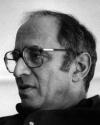Thomas S Kuhn
Thomas S. Kuhn | |
|---|---|
 | |
| Born | July 18, 1922 |
| Died | June 17, 1996 |
| Residence | Cambridge, MA, United States |
| Nationality | US |
| Known for | Philosophy of Science, History of Science |
| Scientific career | |
| Fields | Professor of the History of Science |
Thomas Samuel Kuhn was an American intellectual who wrote extensively on the history of science and developed several important notions in the philosophy of science. Kuhn was born in Cincinnati, Ohio to Samuel L. Kuhn, an industrial engineer, and Minette Stroock Kuhn. He obtained his B.S. degree in physics from Harvard University in 1943, and M.S. and Ph.D. degrees in physics in 1946 and 1949, respectively. He later taught a course in the history of science at Harvard from 1948 until 1956 at the suggestion of university president James Conant. After leaving Harvard, Kuhn taught at the University of California, Berkeley, in both the philosophy department and the history department, being named Professor of the History of Science in 1961. At Berkeley, he wrote and published (in 1962) his best known and most influential work: [/wiki/The_Structure_of_Scientific_Revolutions The Structure of Scientific Revolutions]. In 1964, he joined Princeton University as the M. Taylor Pyne Professor of Philosophy and History of Science. In 1979, he joined the Massachusetts Institute of Technology (MIT) as the [/wiki/Laurance_Rockefeller Laurance S. Rockefeller] Professor of Philosophy, remaining there until 1991. Kuhn interviewed and taped Danish physicist Niels Bohr the day before Bohr's death. The recording contains the last words of Niels Bohr caught on tape. In 1994, Kuhn was diagnosed with cancer of the bronchial tubes, of which he died in 1996. Thomas Kuhn was married twice, first to Kathryn Muhs (with whom he had three children) and later to Jehane Barton (Jehane R. Kuhn). - Wikipedia
Books
- 1962/1970/1996 - "The Structure of Scientific Revolutions" (Read in full)